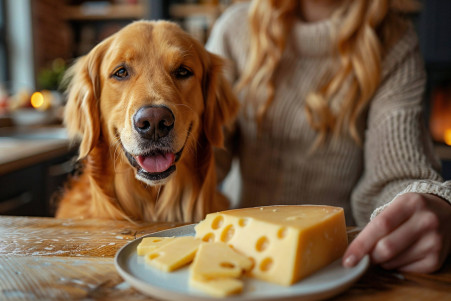Can Dogs Eat Brie Cheese? Risks, Benefits, and Guidelines
5 April 2024 • Updated 3 April 2024

Does your pup have a hankering for the rich, creamy taste of brie cheese, or is this dairy product something you should keep out of your dog’s reach? While brie cheese can be given to dogs in small amounts, it’s not recommended because it’s high in fat and lactose. Soft cheeses like brie can lead to digestive upset, including diarrhea and vomiting, in many dogs. As a result, you should avoid giving your dog brie and instead stick to treats that are safe for dogs.
Although it may seem like a straightforward question, the more we look into whether dogs can eat brie cheese, the more nuances we find. In this article, we’ll explore the topic by drawing on the expertise of veterinary nutritionists, pet food specialists, and dog owners. Together, their insights will help us learn more about the potential risks and benefits of giving dogs brie and other dairy products, as well as the best ways to serve them to our four-legged friends.
Can dogs eat brie cheese?
Understanding the Risks: Health Concerns of Feeding Dogs Brie
There are several health concerns associated with feeding dogs brie, most of which are related to the high fat and lactose content of the cheese. BeChewy explains that cheese can lead to weight gain in dogs due to its high fat content, so dog owners who are worried about their pet's weight should avoid giving them brie. The site also explains that brie and other high-fat cheeses should be avoided in dogs who have had pancreatitis, a severe and potentially life-threatening digestive disorder.
Lactose intolerance is extremely common in dogs, and PetMD points out that dogs don't have the enzyme lactase that's necessary to digest dairy products like brie, which is high in lactose. This can lead to a variety of gastrointestinal problems, including diarrhea, vomiting, gas, bloating and abdominal pain. Some dogs may also have dairy or cheese allergies, which WagWalking explains can lead to skin problems, ear infections, and other allergic symptoms.
Some dogs may be more at risk for issues associated with brie due to underlying health conditions. Hill's Pet Nutrition explains that fatty foods like cheese can potentially cause pancreatitis, especially in dogs that are predisposed to the condition. The fat in cheese can also make obesity, diabetes, or kidney disease worse in some dogs. It's important to watch dogs closely after they eat brie or any other dairy product for signs of digestive issues or allergic reactions, and to contact a vet if any problems arise.
Healthier Cheese Alternatives for Dogs
Although brie cheese isn't the best option for dogs, there are some cheeses that can be healthier alternatives when given in moderation. PetMD lists low-fat cheeses such as cottage cheese, mozzarella, and Swiss as cheeses that are generally easier for dogs to digest because of their lower lactose and fat levels. Meanwhile, BullysticksCentral says that mozzarella and cottage cheese are good choices because they have lower fat content than other cheeses, and Swiss cheese is lower in lactose.
The Rogue Pet Science blog also says that aged cheeses like cheddar and Parmesan could be good options since they have lower lactose levels than soft cheeses. However, it's important to introduce any new cheese to a dog's diet slowly and in small amounts and to watch for any signs of an adverse reaction.
A veterinarian can help determine which cheeses are best for a dog based on their specific health concerns and dietary needs, especially if a dog has a sensitivity or intolerance. Knowing which cheeses are healthier alternatives can help dog owners give their pets a special treat while keeping potential problems to a minimum.
Everything in Moderation: How Much Cheese Can Dogs Have?
Even if you opt for one of the healthier cheeses, it's still important to limit the amount of cheese you give your dog to avoid potential health problems. According to Daily Paws, most experts recommend that most dogs be given no more than a few small bites of cheese a day, with small dogs being able to handle a little less and large dogs being able to handle a little more. The site explains that your dog should get no more than a few small bites of cheese each day. Some dogs cannot handle cheese at all. Larger dogs can handle a little more, and small dogs can handle less.
Cheese should be an occasional treat and not a regular part of a dog's diet, which should be made up primarily of a balanced, complete dog food. As the Rover.com blog says, "Treats are meant as an occasional food, so practice moderation when feeding your dog dairy products." If you're going to give your dog cheese, it's best to stick to plain cheese and avoid any that contain potentially harmful ingredients like herbs, spices, or garlic.
It's also important to keep an eye on your dog's weight and overall well-being if you're going to give them cheese or another high-fat treat. In fact, according to Daily Paws, in general, any food separate from your dog's normal food should not account for more than 10 percent of their calories per day. By keeping this in mind, dog owners can make sure that giving their dog the occasional piece of cheese won't have a negative impact on their health.
Cheese Rinds and Accidental Ingestion: What to Do
Although cheese rinds are not poisonous to dogs, JustAnswer explains that they can still lead to stomach issues, especially if a dog eats a lot of them. If a dog has eaten a lot of cheese or cheese rind, it's best to watch them for signs of stomach upset, such as a loss of appetite, vomiting, and diarrhea.
If a dog has eaten too much cheese, JustAnswer suggests that the dog should be fasted for 12-24 hours and then given small amounts of plain, boiled protein and rice or pasta. Over-the-counter medications like Pepcid AC can also be given to help with any stomach upset that results from a dog eating too much cheese.
That said, if a dog has severe or ongoing symptoms, such as vomiting or diarrhea that won't stop, it's important to get in touch with a vet for help, according to Wamiz. It's also best to contact a vet if you have any concerns about a dog's reaction to eating cheese.
Conclusion: Weighing the Pros and Cons of Feeding Dogs Brie
While brie cheese is not the healthiest option for dogs due to its high fat and lactose content, some dogs can enjoy it in small amounts as a special treat. However, it's important to watch for signs of lactose intolerance and other allergic reactions when feeding dogs brie or any other dairy product.
Healthier cheese choices, such as low-fat options like cottage cheese and mozzarella, or hard, aged cheeses like cheddar and Parmesan, may be better choices for most dogs. It's also important to remember that any high-fat treat should be fed in moderation and that cheese should never be used as a substitute for a nutritionally complete dog food.
By learning about the potential drawbacks and benefits of feeding dogs brie and other cheeses and following recommended portion sizes, pet parents can make the best decisions about whether to include these foods in their dogs' diets.


